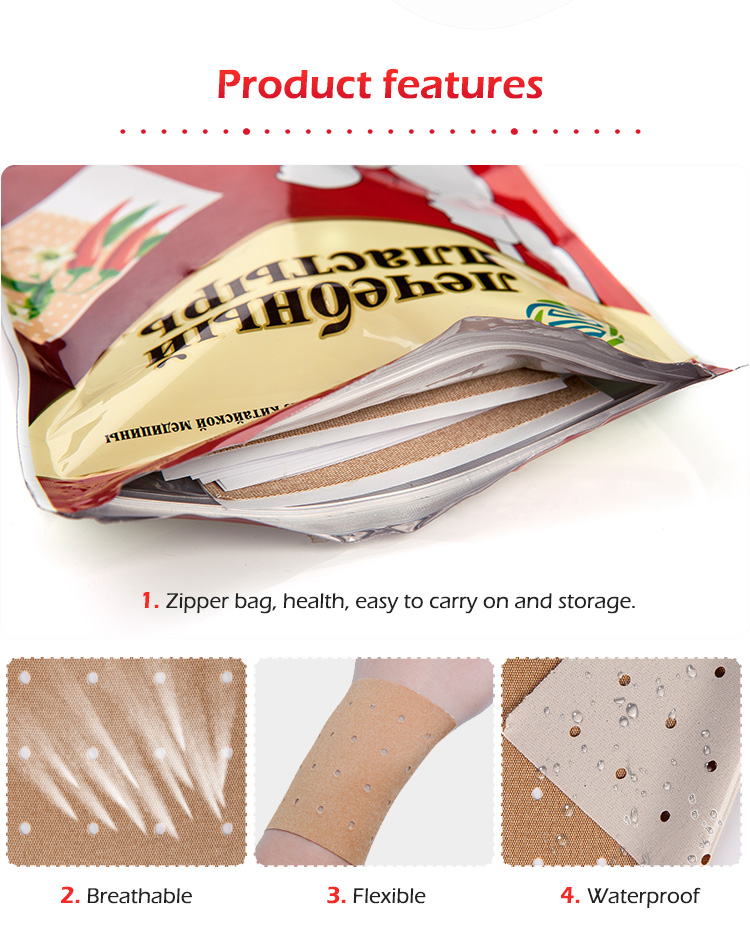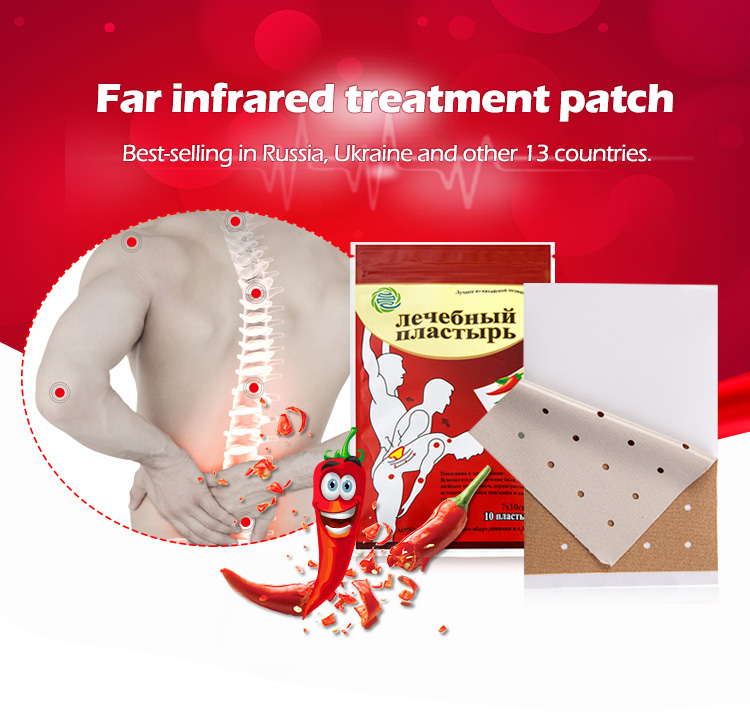Natural Capsicum Plaster OEM: Ensuring Compliance with Global Standards
In today’s wellness and pharmaceutical industries, Natural Capsicum Plasters have become a top-selling, non-invasive solution for relieving muscular pain, joint discomfort, arthritis, and inflammation. As global demand increases, businesses across healthcare, sports, and wellness markets are capitalizing on the opportunity to launch their own branded or custom products through Natural Capsicum Plaster OEM services.
However, entering international markets requires strict attention to regulatory compliance, especially when dealing with skin-contact therapeutic products. Whether you’re a brand aiming for private label success or a startup planning a custom product launch, it’s essential to partner with a Natural Capsicum Plaster Manufacturer or Supplier who understands the regulatory landscape and can guarantee quality across borders.
This article provides an in-depth look at how to ensure compliance with international standards through OEM partnerships. We’ll also explore the role of certifications, product testing, documentation, and regulatory strategy in making your Custom Natural Capsicum Plaster globally marketable.

1. The Rising Demand for Compliant Natural Capsicum Plasters
With increasing demand for drug-free, herbal pain relief options, Natural Capsicum Plaster OEM production is on the rise. These plasters are widely accepted because they:
Deliver topical relief using natural capsaicin
Offer long-lasting effects with minimal side effects
Bypass the digestive system, avoiding gastrointestinal issues
Are easy to apply and portable
But as product volumes grow and brands seek international expansion, regulatory scrutiny becomes a crucial concern.
Countries like the U.S., EU nations, Canada, Japan, and Australia enforce stringent rules around ingredients, safety, labeling, and medical device classification. To navigate these successfully, brands must rely on a knowledgeable and compliant Natural Capsicum Plaster Supplier.
2. Key Global Regulatory Bodies and Standards
Understanding and aligning with these standards is non-negotiable for any OEM project:
| Country/Region | Regulatory Body | Relevant Standards |
|---|---|---|
| United States | FDA (Food and Drug Administration) | OTC Drug Monograph, 21 CFR Part 820 |
| European Union | EMA / CE Certification via MDR | ISO 13485, EU MDR (Regulation 2017/745) |
| Canada | Health Canada | Natural Health Products Regulations |
| Japan | PMDA (Pharmaceuticals and Medical Devices Agency) | GQP, GMP for quasi-drugs |
| Australia | TGA (Therapeutic Goods Administration) | Australian Register of Therapeutic Goods (ARTG) |
3. Certifications to Look for in an OEM Partner
Before choosing a Natural Capsicum Plaster Supplier, verify their certifications. The following are essential indicators of compliance and quality control:
ISO 13485 – International standard for medical device quality management systems
GMP (Good Manufacturing Practices) – Ensures hygienic, consistent, and controlled production
CE Mark – Confirms conformity with EU health, safety, and environmental protection standards
FDA Registration – Mandatory for products sold in the U.S. market
MSDS (Material Safety Data Sheet) – Details on the product's chemical composition and safety
These certifications show that your OEM partner has the capabilities to produce and manage compliant Private Label Natural Capsicum Plaster or custom solutions.
4. Product Testing and Documentation: The Backbone of Compliance
a. Ingredient Verification
Your OEM partner should conduct raw material testing to ensure the capsaicin and other herbal components meet purity and concentration specifications.
b. Stability Testing
Testing under various environmental conditions ensures your product maintains effectiveness and safety throughout its shelf life.
c. Biocompatibility and Skin Sensitivity Testing
Especially important for transdermal patches. Tests include:
Cytotoxicity
Sensitization
Irritation
These are mandatory in regions that treat plasters as Class I or Class II medical devices.
d. Label and Packaging Compliance
Your Natural Capsicum Plaster OEM should help ensure labels meet the following requirements:
Proper usage instructions
Ingredient lists
Allergen information
Manufacturer address and lot number
Storage instructions
Legal disclaimers (e.g., “not a drug” or “for external use only”)
Failing to comply with labeling standards can lead to customs rejections or penalties.
5. How OEM Partnerships Help Ensure Global Compliance
A professional Natural Capsicum Plaster Manufacturer with global reach typically offers the following:
a. Regulatory Consultation
Guidance on classifying the product under relevant medical device or natural product categories.
b. Documentation Preparation
They can prepare:
Product Dossiers
Clinical or performance study summaries
MSDS
Technical Files for CE Mark
FDA Monograph alignment (U.S.)
c. Assistance with Product Registration
Top Natural Capsicum Plaster Suppliers have experience submitting products for:
FDA OTC listing
CE self-certification or notified body approval
TGA and Health Canada listings
NMPA (for China) and ASEAN market entries
These services reduce risks and cut time-to-market significantly.
6. Custom Natural Capsicum Plaster: Regulatory Tailoring
Every country has its own requirements for herbal ingredients, excipients, and even adhesives. OEM customization allows you to adjust formulations for compliance. Examples:
EU restricts some synthetic preservatives; use natural alternatives
FDA requires OTC drugs like capsaicin patches to align with the drug monograph
China requires SFDA registration for medical products with specific TCM ingredients
Halal- or vegan-certified adhesives for Middle Eastern or ethical markets
By creating Custom Natural Capsicum Plasters, you can not only meet market demand but also align precisely with legal frameworks.
7. Private Label Compliance: Fast Track with Lower Risk
If developing a fully custom formula seems too time-consuming, Private Label Natural Capsicum Plaster is a lower-barrier alternative. Here’s why it works:
Uses pre-approved, compliant formulations
Comes with ready documentation
OEM handles all backend certifications
Quicker launch timelines (often within 30–60 days)
It’s an ideal choice for new brands or startups testing international markets with minimal regulatory burden.
8. Choosing a Compliant Natural Capsicum Plaster Supplier
To protect your brand and ensure smooth market entry, vet your Natural Capsicum Plaster OEM carefully:
| Evaluation Factor | What to Look For |
|---|---|
| Certifications | GMP, ISO, CE, FDA registration |
| OEM Experience | Track record of compliant exports |
| Documentation Support | Offers full regulatory files |
| Customization Options | Able to tailor formulations by market |
| Production Capacity | Scalable volumes with consistent quality |
| Lab Capabilities | In-house or third-party product testing |
9. Risks of Non-Compliance and How to Avoid Them
Ignoring compliance can lead to:
Product recalls
Import bans
Legal penalties
Damage to brand reputation
Delays in product launch
Working with a certified Natural Capsicum Plaster Manufacturer ensures traceability, batch consistency, and legal adherence—key for sustainable business growth in the wellness and medical device sectors.
10. Final Thoughts: Compliance Is a Competitive Advantage
In today’s interconnected global market, regulatory compliance is not just a legal requirement—it’s a trust-building strategy. Whether you are developing a Custom Natural Capsicum Plaster or scaling a Private Label Natural Capsicum Plaster line, your choice of OEM partner will determine the long-term viability and success of your product.
With the right Natural Capsicum Plaster OEM by your side, you can:
Launch in global markets with confidence
Save time and cost in development
Ensure user safety and satisfaction
Differentiate your brand with trusted quality
Related Questions and Answers
Q1: Why is regulatory compliance important for Natural Capsicum Plasters?
A: It ensures your product is safe, legally sellable, and trusted by consumers across different markets.
Q2: What certifications should a Natural Capsicum Plaster Manufacturer have?
A: ISO 13485, GMP, CE marking, and FDA registration are key for global compliance.
Q3: What’s the difference between OEM and Private Label Natural Capsicum Plaster?
A: OEM allows for full customization, while private label uses existing compliant formulations under your brand.
Q4: How do I ensure my Custom Natural Capsicum Plaster meets FDA standards?
A: Work with an OEM familiar with the FDA OTC drug monograph and who provides required documentation.
Q5: Can a Natural Capsicum Plaster Supplier help with international product registration?
A: Yes, experienced suppliers often assist with CE, FDA, TGA, and other market-specific registrations.






